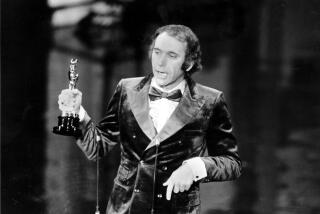Second and wrong
“The Longest Yard” is a gritty underdog comedy about a disgraced former NFL star turned kept man who lands in jail after destroying his girlfriend’s car; then redeems himself by leading his fellow convicts in a victorious football game against the prison guards.
I’m talking, of course, about the 1974 original, starring Burt Reynolds -- an actor whose mustache alone could take on any number of masochistic corrections officers. The movie that’s out now is a remake of that film, and it stars Adam Sandler -- an actor who doesn’t even have a mustache.
For the record:
12:00 a.m. May 28, 2005 For The Record
Los Angeles Times Saturday May 28, 2005 Home Edition Main News Part A Page 2 National Desk 1 inches; 33 words Type of Material: Correction
“The Longest Yard” -- A review of “The Longest Yard” in Friday’s Calendar section referred to the corrections officers in the original film as being masochistic. It should have described them as sadistic.
There’s no point in going into a blow-by-blow comparative analysis of the two, mainly because “The Longest Yard” redux is aimed at people whose parents were just learning to drive in 1974. But just for the sake of marveling at how much times have changed since then, movie-wise, compare and contrast the following opening scenes: Paul Crewe (Reynolds) and his cheesecakey girlfriend are lying on the bed at crossed purposes. She’s trying to seduce Paul, Paul’s trying to get drunk and watch the game. Frustrated, the girlfriend starts berating him for being the lazy, drunken, expensive has-been he is, and Paul eventually reacts by slamming her against the wall, stealing her Maserati and pitching it into the bay.
In the new movie, Paul is alone in the bedroom watching football drunk, when his girlfriend, an alarmingly thin and shrill Courteney Cox, bursts in and demands he put on a little sailor suit and come downstairs to entertain her guests. Why she wants him to wear a little sailor suit is never explained. Paul reacts by locking her in the closet, stealing her Bentley and wrecking it in a multi-patrol car pile-up.The point being: Burt Reynolds’ Paul was supposed to be a jerk. A cool jerk, a tough jerk, even a sexy jerk, but a jerk nonetheless. It’s only when he takes on even bigger jerks (masochists and racists who look like they’ve walked off the pages of a Nazi fetish magazine) that he gets to be a hero. Sandler’s Paul, by contrast, is supposed to be a mensch, basically, a regular guy who has “made some mistakes,” as the kids say nowadays, and is now reduced to being trotted out like a circus monkey for the amusement of his castrating power girlfriend’s uppity friends.
Sandler is a charismatic and extremely likable actor, and he does a decent impersonation of tough and sexy here, but the weird casting and tortured characterization knocks the whole film off-kilter. The remake follows more or less the same plot as the original, only with all the social subtext removed. The result is that the prison (this time set in Texas instead of Florida) feels like summer camp, only with cigarettes and smuggled Big Macs. And in return for buying Adam Sandler as a former NFL quarterback and Chris Rock as a guy who could survive a day in prison, we get jokes about testicles.
Paul finds himself between a rock and nut case when Capt. Knauer (William Fichtner) lets him know that Warden Hazen (James Cromwell) is going to ask him to coach the guards’ football team and that he’s to politely decline without ratting out Knauer. The warden is fanatical about his team; he’s hired his guards based on their ability to play and wants to ensure they’ll win their first game of the season.
Knauer doesn’t want him anywhere near his team, because Crewe is universally loathed for point shaving. (He’s the only player ever to be indicted on federal racketeering charges.) You can see his dilemma. Paul does as Knauer tells him, and Knauer beats him like a drum. Finally, the warden decides that Crewe will train a group of cons to play a “tune-up” game against the guards -- ensuring the guards an easy victory and a boost in confidence before the start of the season.
Paul’s resourceful sidekick, Caretaker, is played by Chris Rock, who is always funny, but as an actor he comes off like a comedian trying to make sure the people in the back row can hear him. Caretaker helps Paul recruit the most violent, hard cases for the team; though, for violent types, the team members are surprisingly kittenish. Sure, there’s the guy who wiles away the days banging his head against the wall (that would be Dalip Singh, a strapping, taciturn 7-footer who promises to be the Richard Kiel -- the guy who played Jaws in “Moonraker” -- of our day). I’ve never been to prison, but the mentally defective seem to be unusually well-represented here. At least a third of the cast appears to be operating at concussed squirrel capacity.
Burt Reynolds reprises the role of Nate Scarborough, the old head coach, and rapper Nelly plays Meggett, the running back whose reluctance to join the team emanates mainly from a feeling of sports’ contempt -- a white-men-can’t-jump sort of thing -- that’s quickly resolved with a violent game of one-on-one.
With Paul cleaned up and the darkness of the original cleared away, “The Longest Yard” is left with little to work with besides puerile jokes (rendering the movie’s central violent tragedy jarring and absurd) and displays of athletic ability. The cast includes several figures from the worlds of football, basketball and professional wrestling, plus Tracy Morgan as a cross-dressing cheerleader. The sports cinematography is impressive and probably the only tangible improvement on the first one. If you’re thinking of seeing it, and you’re old enough to drive (or even read this), do yourself a favor and rent the original instead.
*
‘The Longest Yard’
MPAA rating: PG-13 for crude language and sexual humor, violence, language and drug references
Times guidelines: Too crude and violent for kids, too dumb for adults.
Paramount Pictures and Columbia Pictures present a Happy Madison/MTV Films production, in association with Callahan Films. Director Peter Segal. Screenplay by Sheldon Turner. Based on the screenplay by Tracy Keenan Wynn. Director of photography Dean Semler. Editor Jeff Gourson. Production designer Perry Andelin Blake. Running time: 1 hour and 49 minutes.
In general release.
More to Read
Only good movies
Get the Indie Focus newsletter, Mark Olsen's weekly guide to the world of cinema.
You may occasionally receive promotional content from the Los Angeles Times.










